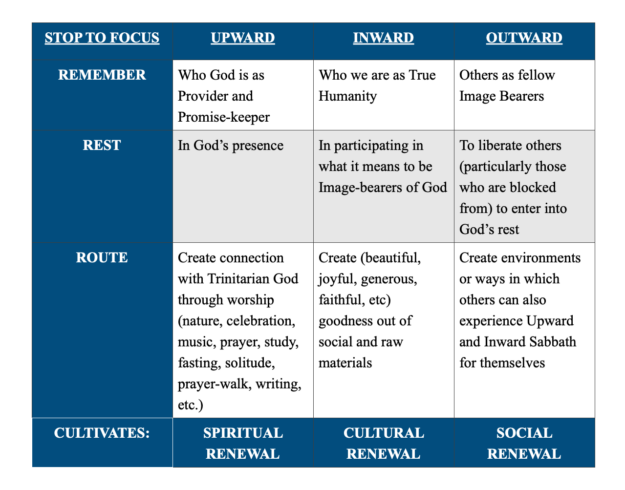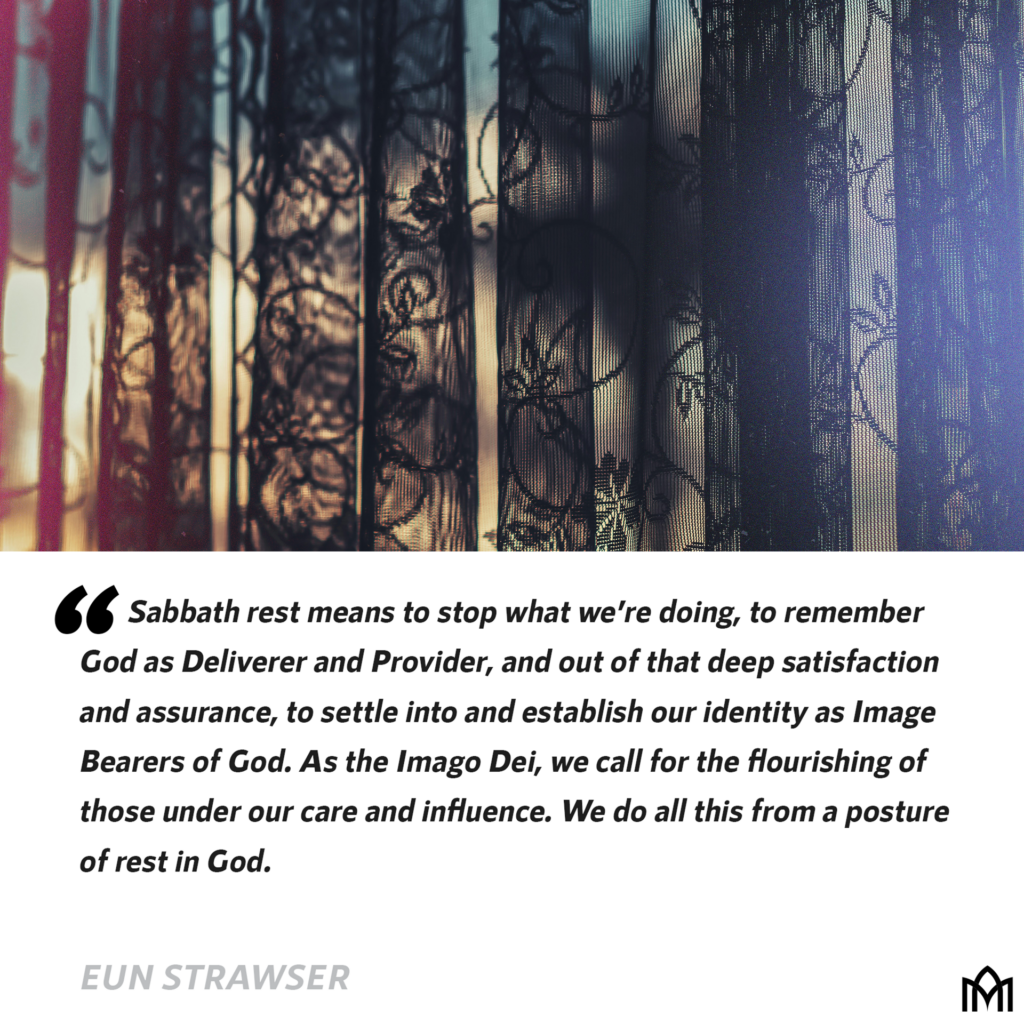Sabbath Isn’t About Stopping
In this day and age, ministry leaders hyper focus on the ideal of practicing Sabbath and taking a Sabbatical. We do this not because we want our congregations to lean on the value of rest but perhaps because we are hyper focused on the impact that work has on us physically, emotionally, mentally, and spiritually. To acknowledge an obvious point from the beginning – Yes, our ministries as pastors and Christian leaders is work. This statement feels like the great taboo leaders mustn’t complain of — The fact that ministry work is hard work and that it takes a toll on us as leaders. In our Western culture, ministry leaders live in the reality of a deep decline of pan-health. What started off as already dangerously low for most Christian leaders in the categories of spiritual, physical, mental, and emotional well-being prior to the onset of the COVID-19 pandemic, has only abruptly peeled away the veneer and unveiled a deep dissatisfaction in ministry life.
It’s embarrassing to admit this as a pastor myself, but the overall quality of life, particularly in cultivating sustainable, life-giving friendships, is terribly challenging for the majority of pastors.
I was sitting in a coffee shop recently, eavesdropping on a pair of ministry leaders chatting about, well, leaving the pastorate. One had already transitioned out a year prior, and the two of them were meeting over lattes to discuss options for leaving. Over the course of the hour, they reminisced about how much they felt the worthwhileness of their calling, but equally experienced the dismantling of their physical, mental, emotional, and spiritual well-being. They spoke about taking on a more “regular” job in order to stop ministry work. What stopped me in my tracks, however, was over-hearing this: These pastors described this work transition as taking a ‘Sabbath rest from ministry.’
It’s curious to me that Sabbath is often linked to stopping.
In general, when we hear the word “Sabbath,” we as Christian leaders think about leading a Sunday morning worship service, preaching, singing worship songs, talking story with congregants at coffee hour, and then having the rest of Sunday afternoon and maybe even Monday off. Off means not having any meetings, not prepping a sermon, and not interacting with congregants. For most pastors, Sabbath reminds us of either an unattainable ideal where we are fruitlessly striving to find a restful environment from an exhausting week, or the reality of simply checking out so that we can enter another grueling week of work. Either way, this mindset only deepens the relational isolation most leaders already experience. Whether we think that Sabbath is about recovery from hosting a Sunday service or a way to recuperate from growing burn-out, it is spiritual practice that God addresses over and over again – which must mean that it’s something central to imitating Jesus that we need to piece together.
Yes, our ministries as pastors and Christian leaders is work. This statement feels like the great taboo leaders mustn’t complain of — The fact that ministry work is hard work and that it takes a toll on us as leaders. Share on X
Consider Deuteronomy:
“Observe the Sabbath day, to keep it holy, as the Lord your God commanded you. Six days you shall labor and do all your work, but the seventh day is a Sabbath to the Lord your God. On it you shall not do any work, you or your son or your daughter or your male servant or your female servant, or your ox or your donkey or any of your livestock, or the sojourner who is within your gates, that your male servant and your female servant may rest as well as you. You shall remember that you were a slave in the land of Egypt, and the Lord your God brought you out from there with a mighty hand and an outstretched arm. Therefore the Lord your God commanded you to keep the Sabbath day.” (Deuteronomy 5:12-15 ESV)
The concept of Sabbath was first introduced only after the Israelites made their exodus out of Egyptian slavery and became a freed people of God. As God’s people, set apart to share with the rest of the nations what it looks like to be led and shaped by God himself for the flourishing of the world, Sabbath was a practice to help God’s people remember and rest — but to remember and rest in a particular way. Sabbath helps to:
-
- Set God’s people apart as they remember and rest in God as Deliverer and Provider, and to
- Establish rest for everyone and everything under our care and influence.
Sabbath connects us deeply with God and with those in our relational orbit.
As God’s people, set apart to share with the rest of the nations what it looks like to be led and shaped by God himself for the flourishing of the world, Sabbath was a practice to help God’s people remember and rest. Share on X
We need to recognize that Jesus put his life on the line to define the practice of Sabbath. Matthew records the following conversation between Jesus and his disciples on the Sabbath:
“At about that time Jesus was walking through some grainfields on the Sabbath. His disciples were hungry, so they began breaking off some heads of grain and eating them. But some Pharisees saw them do it and protested, ‘Look, your disciples are breaking the law by harvesting grain on the Sabbath.’
Jesus said to them, ‘Haven’t you read in the Scriptures what David did when he and his companions were hungry? He went into the house of God, and he and his companions broke the law by eating the sacred loaves of bread that only the priests are allowed to eat. And haven’t you read in the law of Moses that the priests on duty in the Temple may work on the Sabbath? I tell you, there is one here who is even greater than the Temple! But you would not have condemned my innocent disciples if you knew the meaning of this Scripture: ‘I want you to show mercy, not offer sacrifices.’ For the Son of Man is Lord, even over the Sabbath!’
Then Jesus went over to their synagogue, where he noticed a man with a deformed hand. The Pharisees asked Jesus, ‘Does the law permit a person to work by healing on the Sabbath?’ (They were hoping he would say yes, so they could bring charges against him.)
And he answered, ‘If you had a sheep that fell into a well on the Sabbath, wouldn’t you work to pull it out? Of course you would. And how much more valuable is a person than a sheep! Yes, the law permits a person to do good on the Sabbath.’
Then he said to the man, ‘Hold out your hand.’ So the man held out his hand, and it was restored, just like the other one! Then the Pharisees called a meeting to plot how to kill Jesus. (Matthew 12:1-14 NLT)
Sabbath was so important that the instigating case for Jesus’s own death was the belief that Jesus was breaking the Sabbath law. So, what does Sabbath mean for Jesus? His focus was on remembering who we are as Image Bearers of God and resting in – settling into – that identity and calling as the Imago Dei. By implication, this included the flourishing of all under our care and influence. Jesus defined Sabbath as practicing who we are meant to be and what we are meant to do in the Kingdom of God.
Again, Sabbath connects us deeply with God and with those in our relational orbit.
Sabbath was so important that the instigating case for Jesus’s own death was the belief that Jesus was breaking the Sabbath law. Share on X
Truly wresting with the practice of Sabbath causes us to go back to the beginning of the Scriptural narrative. Genesis declares that the Triune God practices Sabbath rest as a coda within the creation narrative:
“Thus the heavens and the earth were completed in all their vast array. By the seventh day God had finished the work he had been doing; so on the seventh day he rested from all his work. Then God blessed the seventh day and made it holy, because on it he rested from all the work of creating that he had done. (Genesis 2:1-3 NIV)
In Genesis, we see that God himself, after the progressive work of days one through six, after everything He created and cultivated was “very good,” took the seventh day, set it apart, and rested in creation. God enjoyed what He had made, participating in its very life. He blessed it and allowed for creation to flourish.
So, in light of all of this, what does the term Sabbath actually mean?
Sabbath, from the Hebrew word שבת (“Shabbat”), literally means to intentionally stop, or to take a pause, in order to remember and rest. More so, the word “rest” נוּחַ (“nuach”) means to “settle in” or “establish.” Wedding these concepts together, Sabbath rest means to stop what we’re doing, to remember God as Deliverer and Provider, and out of that deep satisfaction and assurance, to settle into and establish our identity as Image Bearers of God. As the Imago Dei, we call for the flourishing of those under our care and influence. We do all this from a posture of rest in God.
What does this subversive practice look like in our busy, performance-based culture, where success is often measured, even in our roles as ministry leaders, in how much we work and produce? How do we practically engage in remembering and resting?
In my local church community, Ma Ke Alo O, we equip our leaders and congregants to practice Sabbath in this way:

In Summation
To engage in Sabbath rest is to practice the reality of the Kingdom of God on a regular basis so that our hope in God’s full presence, our full humanity, and our culture’s full renewal can be experienced little by little in the here and now. Sabbath is to practice, in the midst of a broken world, on this side of new creation, an imagination of what the Kingdom of God can be like. We remember and rest in God as Deliverer and Provider, and how in response we as true humanity partner with God to empower those in our communities to flourish under our care and influence. As we liberate others as fellow Image-Bearers of God, we empower them to enter into that same remembrance and rest. Sabbath keeping is ultimately a means to cultivate spiritual, cultural, and social renewal within the Kingdom of God, here and now.
///
Sabbath rest means to stop what we’re doing, to remember God as Deliverer and Provider, and out of that deep satisfaction and assurance, to settle into and establish our identity as Image Bearers of God. (1/2) Share on X
As the Imago Dei, we call for the flourishing of those under our care and influence. We do all this from a posture of rest in God. (2/2) Share on X
*Editorial Note: The team at Practicing the Way released their Sabbath Practice last year as the first of nine spiritual practices foundational to maturing as a disciple in the way of Jesus. We recommend their resources as a starting place if the spiritual practice of Sabbath-Keeping is new to you. ~CK




